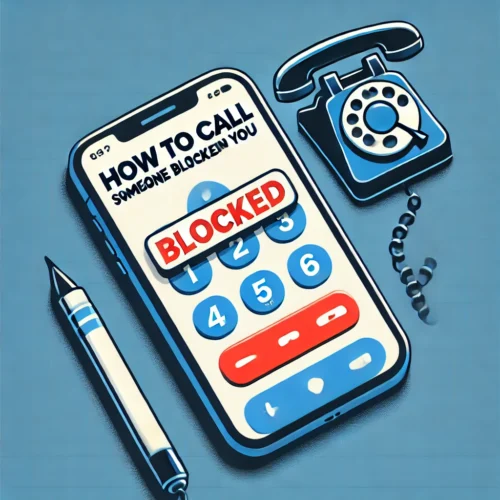How to Call a Person Who Has Blocked Your Number A Comprehensive Guide. Getting blocked by someone can be frustrating, especially if you have an urgent or important message to convey. However, calling a person who has blocked your number is a delicate matter. It’s crucial to be considerate and aware of the reasons for the block. In this article, we explore the different methods you can use to call someone who has blocked your number, while ensuring that you’re not violating any boundaries.
How to Call a Person Who Has Blocked Your Number A Comprehensive Guide
Why Would Someone Block Your Number?
Before you attempt to call someone who has blocked your number, take a moment to reflect on the reason they may have done so. There are several possible reasons, including:
- Disagreements or conflicts
- Constant communication that became overwhelming
- Privacy concerns
If the block was due to your behaviour, consider whether it’s appropriate to contact them again. If it’s for a legitimate reason, proceed with the following methods.
Method 1: Calling From Your Own Phone
1. Disguise Your Caller ID
One way to bypass a block is to hide your caller ID. This prevents the recipient from knowing it’s you who is calling. Both iPhone and Android phones allow you to turn off the caller ID.
For iPhone:
- Go to “Settings.”
- Tap “Phone.”
- Disable “Show My Caller ID.”
For Android:
- Open “Settings.”
- Go to “Call Settings.”
- Select “Hide Number.”
2. Dial *67
Another option is dialing *67 before the recipient’s phone number. This will make your call appear as “Private” or “Unknown.” It may work on both cell phones and landlines, but it won’t always work with businesses.
- Example: *67-123-456-7890.
3. Use an App with a Random Number
Some apps provide temporary phone numbers that can be used to make calls or send texts. These numbers are typically anonymous, which may help you get past the block. Apps like Google Voice or Burner assign random numbers and allow you to call someone without revealing your actual phone number.
4. Call a Landline
Many landline services do not support call blocking for individual numbers. If you know the person’s landline number, you might still be able to contact them using that number.
5. Change Your Number
If all else fails, you can contact your phone service provider and request a number change. Although this may come with a small fee, it will allow you to make calls from a new number. However, if the person blocked you for a valid reason, they may block your new number as well.
Method 2: Calling From a Different Phone
1. Use a Public Phone
Public payphones or hotel phones are great tools for making calls without your personal number being revealed. Using these can help you contact someone who has blocked your phone number. However, this method may only work a couple of times before the recipient catches on and stops answering calls from unknown numbers.
2. Ask a Friend for Help
If you have a trusted friend, you can ask to use their phone to make the call. This can help you bypass the block without using your number. However, be mindful that repeatedly using a friend’s phone could lead to them getting blocked as well.
3. Consider Using a Proxy
If the person is likely to hang up as soon as they hear your voice, consider asking a mutual friend or family member to act as a mediator. The proxy can relay your message, which may feel less intrusive to the blocked person.
Example script:
“Hi, this is [Your Friend’s Name], calling on behalf of [Your Name]. They just want to pass on a quick message: [Your Message].”
Method 3: Being Conscious and Thoughtful
1. Think Before You Call
Before you proceed with any of the methods above, take a moment to consider whether it’s truly necessary to contact the person. Repeatedly trying to reach someone who has blocked you can come across as harassment. Ask yourself if calling will resolve anything or if you’re just trying to make your presence known.
2. Be Aware of Legal Consequences
In many cases, repeatedly calling someone who has blocked you can lead to legal consequences. Harassment charges can arise, especially if your actions make the other person feel threatened. Always be aware of the potential for legal ramifications, including restraining orders or criminal charges.
The Caller ID Act of 2009 makes it a crime to use caller ID spoofing to harass or defraud someone. If you’re using methods like disguising your caller ID, do so cautiously.
3. Find Alternative Ways to Reach Out
If you can’t get through to the person, consider other methods like sending an email, writing a letter, or reaching out through social media. If it’s an emergency, try contacting mutual friends or even seeking help from authorities to make contact in an appropriate manner.
Also Read – Modern SEO Strategy Entity Optimization and Beyond
Conclusion
Calling someone who has blocked your number should be approached with care and consideration. Whether you choose to disguise your caller ID, use a friend’s phone, or contact the person through a proxy, it’s important to respect their boundaries. Before proceeding, always ask yourself if the call is truly necessary and if there’s a more effective way to address the situation. In some cases, the best course of action may be to respect the block and give the person the space they’ve asked for.
Key Takeaways:
- Respect boundaries: Don’t harass or annoy the person who blocked you.
- Try alternative methods: Use public phones, apps, or ask friends for help.
- Consider the consequences: Know the legal implications of using certain calling methods.
- Think before calling: Make sure the call is truly necessary and won’t escalate the situation.
This guide will help you understand your options when trying to contact someone who has blocked you, while keeping the situation respectful and legal.




